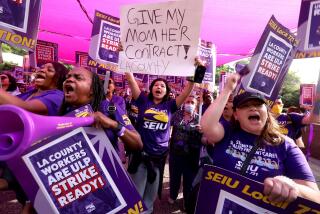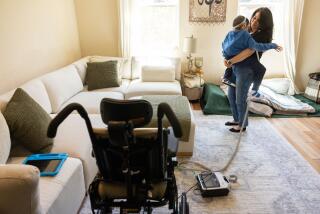Poor Get Aid but Little Comfort
Candy Taylor, 23, is homeless and jobless, with a 6-month-old child. Her welfare benefits, she said, were just cut off. In the midst of a transit strike, she had her car towed away.
On Wednesday, as Los Angeles County workers walked off their jobs, Taylor left her child with a grandparent and walked for hours to the East Valley Department of Public and Social Services office in Panorama City to inquire about her benefits.
At the office, Taylor found a glimmer of good news: The usually bustling office was nearly empty and she wouldn’t have to wait long to see someone.
“I think it’s because people heard about the strike on the news,” Taylor said.
The bad news was that her caseworker was on strike, like most other workers in the office.
County welfare offices remained open, but 43% of unionized employees were no-shows. Officials said clients were seen based on the urgency of their situation.
In the East Valley welfare office, 242 of 322 employees skipped work. Although crowds had thinned by afternoon, morning visitors to the office faced long waits.
As striking workers noisily picketed outside, many clients in the waiting room Wednesday morning were visibly upset.
Rick Davis, 24, came with his pregnant wife and young child for an 8:30 a.m. appointment. By the time he made it past the picket lines and to the receptionist, he was fed up.
“It seems like everybody’s striking since this MTA business,” he said, referring to the transit strike, which extended into its 26th day on Wednesday. Although welfare workers have sought to portray a solidarity with the people they help, Davis and a number of other clients showed little sympathy.
“I work 10- to 12-hour days, and I make just above the minimum wage,” said Davis, a security guard. “They work half as much and make twice the money.”
Even more worried were those with emergencies, such as clients Jerrika Cross, 23, and Patricia Garcia, 38, both of Van Nuys. Cross, who was going to be evicted from her apartment in 72 hours, said welfare workers told her it would take seven hours for her to see someone about assistance.
“Seven hours?” she asked. “These people need help, you know what I mean?”
Garcia was more distraught. Her daughter had a throat infection and was running a high fever.
The day before, she had taken the 7-year-old to Olive View-UCLA Medical Center, the county-run public hospital in Sylmar, but was turned away because of strike actions there, she said. On Wednesday morning, she was hoping to see someone about emergency Medi-Cal benefits before she had to be at work, at 2:30 p.m.
As a working person, Garcia sympathized with strikers--but only to an extent. “I know they need money, but they should ask for it another way, because they’re hurting people like me,” she said.
By afternoon, welfare office workers said they thought they were able to serve everybody eventually--but they were not sure.
“Some of them had to wait two hours,” said one worker who asked not to be identified, “but they always have to wait.”
*
MAIN STORY: A1
More to Read
Sign up for Essential California
The most important California stories and recommendations in your inbox every morning.
You may occasionally receive promotional content from the Los Angeles Times.










